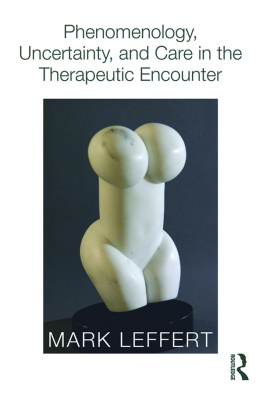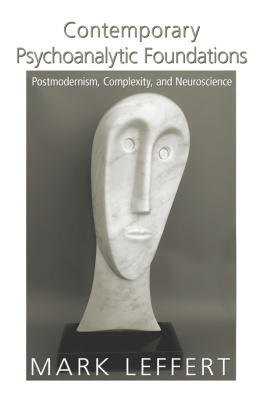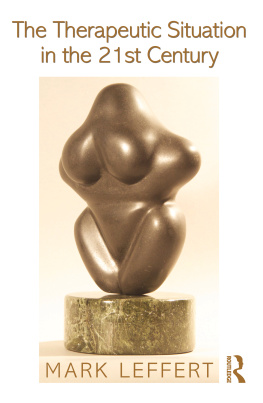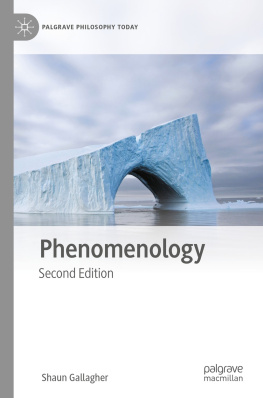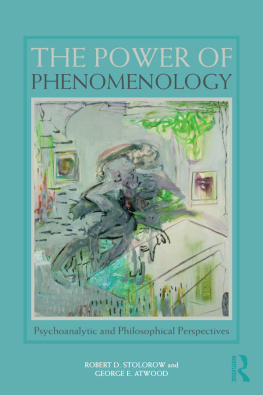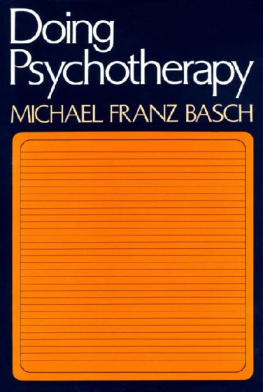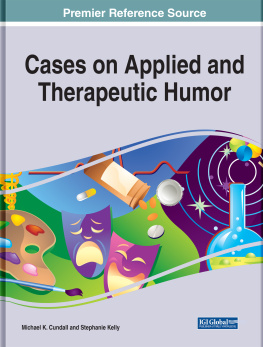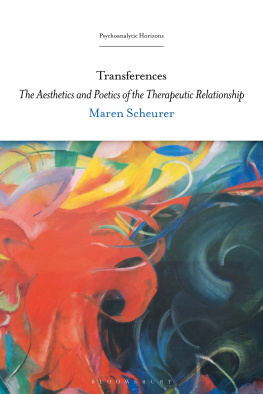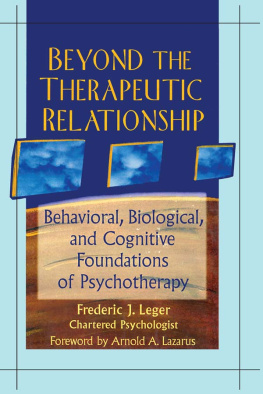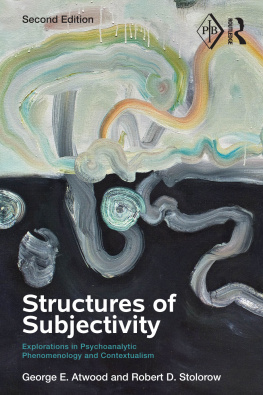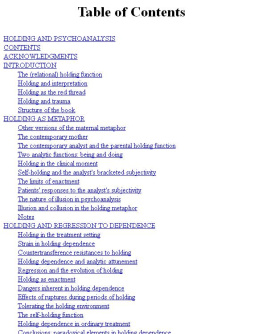Phenomenology, Uncertainty, and Care in the Therapeutic Encounter
Mark Leffert

First published 2016
by Routledge
27 Church Road, Hove, East Sussex, BN3 2FA
and by Routledge
711 Third Avenue, New York, NY 10017
Routledge is an imprint of the Taylor & Francis Group, an informa business
2016 Mark Leffert
The right of Mark Leffert to be identified as author of this work has been asserted by him in accordance with sections 77 and 78 of the Copyright, Designs and Patents Act 1988.
All rights reserved. No part of this book may be reprinted or reproduced or utilised in any form or by any electronic, mechanical, or other means, now known or hereafter invented, including photocopying and recording, or in any information storage or retrieval system, without permission in writing from the publishers.
Trademark notice: Product or corporate names may be trademarks or registered trademarks, and are used only for identification and explanation without intent to infringe.
British Library Cataloguing in Publication Data
A catalogue record for this book is available from the British Library
Library of Congress Cataloging-in-Publication Data
Leffert, Mark.
Phenomenology, uncertainty and care in the therapeutic encounter / Mark Leffert.
pages cm
Includes bibliographical references and index.
1.Phenomenological psychology.2.Psychoanalysis.3.Psychotherapy.I.Title.
BF204.5.L44 2015
616.89'17dc23
2015007732
ISBN: 978-0-415-81259-7 (hbk)
ISBN: 978-0-415-81260-3 (pbk)
ISBN: 978-1-315-70726-6 (ebk)
Typeset in Bembo
by Apex CoVantage, LLC
Contents
Introduction
This is meant to be a radical and subversive book. Although conceived as an entirely independent volume, it is very much a continuation of an ongoing project begun with Contemporary Psychoanalytic Foundations (2010) and The Therapeutic Situation in the 21st Century (2013) and now (apparently) to be continued with Psychoanalysis, Aesthetics, and Well-Being.
This has in no way been a planned series. It has rather followed from the ongoing development of my thinking about psychoanalysis as the research and writing themselves revealed issues that still needed to be pursued with different lenses and from different perspectives. Contemporary Psychoanalytic Foundations (CPF ) offered a hard interdisciplinary critique of metapsychology in general and of even the possibility of any single named metapsychology being able to claim standing. I argued that other disciplines such as neuroscience and complexity theory had much to offer psychoanalytic inquiry into areas such as unconsciousness, consciousness studies, and memory. I posited that a soft postmodern critique of psychoanalysis, one including an integration of the social and the scientific, could offer a foundation for including all of these areas interreferentially into contemporary psychoanalytic thought.
Although CPF has held up as a basic science text critical of psychoanalytic hermeneutics and situating psychoanalysis in the wider, interdisciplinary world, it did not attempt to offer any overarching discussion of clinical psychoanalysis or the therapeutic situation as it exists in contemporary times. The eponymous Therapeutic Situation in the 21st Century (TS21) began this project, offering a rudimentary textbook of psychoanalysis in a new language. TS21 retained a vigorous critique of psychoanalytic orthodoxy and reification. Although clinical innovation in psychoanalysis has always taken place within the framework of some metapsychology, it has remained uncertain whether those frameworks helped or hindered clinical advancement. I have generally followed Gill and Holtzmans (1976) observation that psychology is not metapsychology and that psychoanalysis involves two theories: a very powerful clinical one and a very dubious metapsychological one. I followed a clinical thread in our literature beginning with Freud in his German voice (as opposed to Stracheys voice, modeled on that of a 19th-century British scientist), progressing through the radical ego psychologists of the 1960s and 70s and coming to rest in contemporary critiques both of and by the relational schools. It treated all of them as local knowledges, that is to say, knowledge with limited standing and limited areas of applicability. It offered a much more fully realized discussion of post-structuralism and, along with it, retained a focus on power and its abuses in the psychoanalytic situation.
If there was a problem with CPF and, to a lesser extent, with TS21, it was an overly optimistic view that contemporary relational thought could address the problems psychoanalysis had gotten itself into and how those problems limited therapeutic results. It seemed that the Relational School had entered a phase in which second-generation theorists were elaborating their theories in much the same way that second-generation Freudians were doing in the 1940s, 50s, and 60s. If, however, excessive dedication to or reliance on the theoretical precepts of any of the metapsychological schools only limits therapeutic effectiveness, then what sorts of overarching concepts could offer a grasp of the therapeutic situation?
I have set out to recast psychoanalysis in two ways that, while still privileging the centrality of the therapeutic relationship (that, I will argue, is best understood in terms of the doctor-patient relationship), largely breaks with Contemporary thinking. The first is the development of a phenomenological psychoanalysis tracing its roots to the work of Husserl, Heidegger, May, and Boss, and the second is the unfortunately novel concept of focusing the therapy on what the patient actually wants and needs.
Thinking in phenomenological terms frees up our thinking about both the patient and the therapeutic situation. At its most basic level, what it means is that the patient is simply the patient and the analyst is, well, simply the analyst. For both, reality is always fully deployed; there are no secret depths to be plumbed in either the patient or the analyst. Admittedly, this goes against the grain of everything we have been taught, but what we have been taught involves a fallacy resting on a misunderstanding. There are depths, but they are temporal depths involving the historicity of our being, not some organizational, metapsychological depth. Although it is possible, with some effort, to roughly impose a conscious, temporal scale on our cognitions, no such order seems to exist in memory retrieval into consciousness when such retrieval is possible. There are many sorts of encoded memories that reflect different sources of experiences. Only the most obvious are memories of events: episodic memories, the memories of Tulving (1985/2003) and Schachter (Schacter, 1996; Schacter, Addis, & Buckner, 2008). Then there are the memories that encode how we think: the attachment memories of Bowlby (1969) and Main (George, Kaplan, & Main, 1984); the memories of metacognitive knowledge and Theory of Mind, again of Main (1991) and of Baron-Cohen (Baron-Cohen, 2000; Baron-Cohen, Leslie, & Frith, 1985); and the memory of internal working models of Craik (1943/1952) and again of Bowlby (1969, 1973). There are memories that organize perception, how we see (Gregory, 1997; von Senden, 1932/1960); if sight is not somehow present before adolescence, then we are only able to see swirls of disorganized color. The list goes on. But one thing must stand out about all of this:

